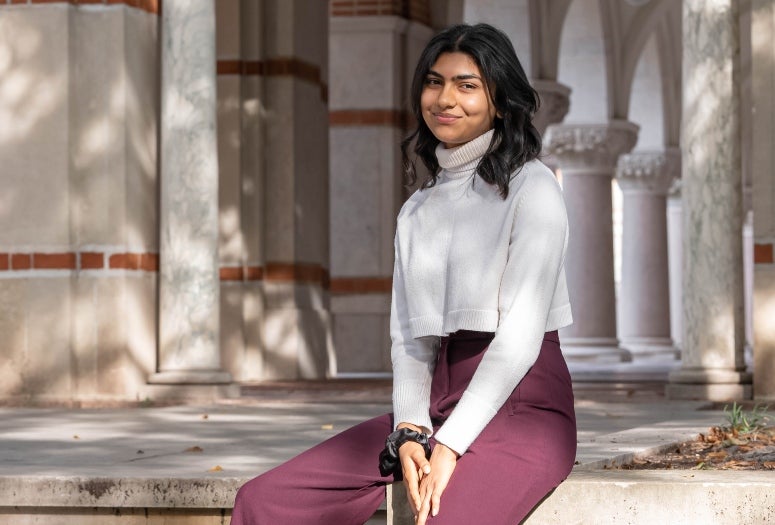At Rice University, Ahi Ajayan ’26 goes quietly about her business as a student at the Wiess School of Natural Sciences.
But on the other side of the world, she’s a hit.
The freshman sings a featured song, “Kannilu Kannilu,” in a new Indian comedy, “Ayisha.”
She’s the voice behind a breezy dance number that was released to YouTube weeks before the film itself. To date, the video has more than 3.5 million views. A “lyric video” of the same song has an additional 2.7 million views. Ajayan herself makes a brief appearance in the video at 2:38.
“My mom said that I was singing all the time as a child,” said Ajayan, the daughter of Pulickel Ajayan, a professor and chair of Rice’s Department of Materials Science and NanoEngineering, and Poornima Ajayan, a finance and data specialist at the George R. Brown School of Engineering. “I used to hum, and every time I was doing activities, I would sing. On my third birthday, my mom put me in classical Indian music lessons.”
She took a liking to the lessons and never stopped performing. Her particular focus is Carnatic music, a subgenre of Indian classical music that evolved from ancient Hindu texts and traditions. (She is featured in a classical concert, also on YouTube, here.)
“Carnatic music is very classical,” Ajayan said. “It is definitely different from Western music. In India, we have Carnatic music and Hindustani. This particular song is more of a northern dialect, and the type of music I learned is more from the south. It's very unique and distinct.”
She describes singing in a different language as tough, but her dedication paid off and her talent has not gone unnoticed. She is the main playback singer for the film’s giant dance sequence.
“When you see a song in a film, you see people who are dancing, but the actors that you see on the screen are not the actual people singing,” she said. “The people singing are behind the scenes. That's why we call them playback. What you see on screen is lip syncing and dancing to a song, but the actors are very much separate from the people singing.”
Ajayan describes the recording process as challenging.
“It was a mix of nerves and excitement because it was my first time recording something on such a big scale in front of a famous, respected person in the industry,” she said, referring to composer M. Jayachandran. “But he had created such a comfortable environment for me and the person mixing the vocals, and that made it a lot easier for me to record. I think it's all about creating an environment where not only you're comfortable, but you feel excited about the song.”
Ajayan entered Rice as a student of cognitive studies, but hopes to find a connection between music and the brain.
“I think it would be interesting to see if I could somehow create a bridge between music and neuroscience and see what the effects are of music on our brains, our development and our cognitive abilities. There's a lot of scope for discovery with cognitive science,” she said.
One thing remains constant – music will always be a part of Ajayan’s life.
“Music has become one of the biggest parts of my life,” she said. “In the studio, I recognized this is what I want to do with my life. I’ve never felt this special about anything else in my life than in that moment. Being able to interact with audiences and see how they respond to my music made me love it and become more passionate about it. I would love to pursue music fulltime, pursue more collaborations and record more songs.”
Rice University student Ahi Ajayan performs on main track in upcoming film 'Ayisha'

Body
